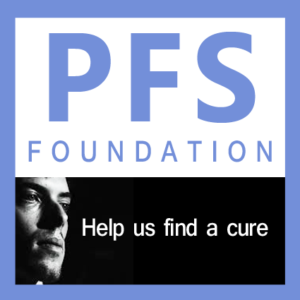Dear Friends:
I began last year’s annual address by letting you know how encouraged I was that the National Institutes of Health had not only added PFS to its Genetic and Rare Diseases Information Center but linked to our website.
 Now I’m equally encouraged to note a similar milestone, achieved exactly one year later, halfway around the globe. In March, New Zealand added a PFS page to its MedSafe directory, complete with sexual, physical, mental and neurological symptoms. And a link to our website.
Now I’m equally encouraged to note a similar milestone, achieved exactly one year later, halfway around the globe. In March, New Zealand added a PFS page to its MedSafe directory, complete with sexual, physical, mental and neurological symptoms. And a link to our website.
That was the first known instance of a foreign ministry of health officially acknowledging the condition. But I hope it won’t be the last; I hope that before the decade is out, nations on every continent follow suit.
Now, to mark the PFS Foundation’s four-year anniversary, I’d like to share some additional highlights of the past 12 months:
 PATIENT SUPPORT: Due to an increasing number of inquires from PFS patients around the globe seeking medical advice, we added a Patient Support section to our Resources page. Listed there are doctors who are aware of PFS and, in some cases, see patients who are believed to have the condition. While none of them professes to know the root cause(s) of PFS, nor claims to have a cure for the condition, they maintain an interest in helping PFS patients manage symptoms as best as possible until clinical research, hopefully, leads to the development of effective therapies.
PATIENT SUPPORT: Due to an increasing number of inquires from PFS patients around the globe seeking medical advice, we added a Patient Support section to our Resources page. Listed there are doctors who are aware of PFS and, in some cases, see patients who are believed to have the condition. While none of them professes to know the root cause(s) of PFS, nor claims to have a cure for the condition, they maintain an interest in helping PFS patients manage symptoms as best as possible until clinical research, hopefully, leads to the development of effective therapies.
To date, 20 doctors across nine specialties – from urologist Seth D. Cohen (right) at New York University’s Langone Medical Center to psychiatrist Luis Guilherme Streb in Porto Allegre, Brazil, to cosmetic surgeon Ilhan Serdaroglu in Istanbul, Turkey – have volunteered to assist in this effort.
Concurrently, we launched a program to connect PFS patients who live in the same geographic area with one another. This has proven successful in quickly enabling those who are in the early stages of PFS – and reach out to us, often desperate for help – to speak with those who are in the later, more stable stages. In some cases, such patients live close enough to meet in person, for added moral support. (If you or someone you know would like to participate in this program, please email social@pfsfoundation.org)
MEDICAL AWARENESS: We’ve continued to expand our list of doctors and other health care professionals worldwide who have backgrounds in finasteride use and research, while educating them on PFS. Year over year, that list has grown from 2,500 to more than 30,000, focusing on staffers at leading hospitals, medical schools and medical journals, as well as national ministries of health. And in January, we began tracking the adverse drug-reaction reports for finasteride housed in the World Health Organization’s VigiBase database, so that medical professionals are aware of the rising global trends.
 MEDIA AWARENESS: Earlier this year, two documentaries on PFS debuted in Europe, one the Spanish public network TV3 (right), and another on the Belgian public network VRT, marking the first time the condition has been the subject of extended TV coverage.
MEDIA AWARENESS: Earlier this year, two documentaries on PFS debuted in Europe, one the Spanish public network TV3 (right), and another on the Belgian public network VRT, marking the first time the condition has been the subject of extended TV coverage.
We’ve also seen additional print-media coverage of the issue, both domestically and abroad. In September, the Australian-based International Business Times ran a story titled Post-Finaseride Syndrome Foundation funds 3 clinical studies on permanent side effects of prostate cancer, alopecia drug. Two months later, Men’s Journal, a leading US consumer publication, published a special report titled New Risks in Hair-Loss Drugs: The side effects of the most common male-pattern baldness pill—depression, insomnia erectile dysfunction—may be worse than we thought. And potentially permanent.
 SOCIAL MEDIA: We enhanced our social media presence last month by redesigning our Twitter, Facebook and YouTube pages, along with our logo (left). If you’d like to help us spread awareness of PFS, please visit us on these platforms and like, follow, share and/or subscribe as you see fit.
SOCIAL MEDIA: We enhanced our social media presence last month by redesigning our Twitter, Facebook and YouTube pages, along with our logo (left). If you’d like to help us spread awareness of PFS, please visit us on these platforms and like, follow, share and/or subscribe as you see fit.
SUPPORTING RESEARCH: Peripheral to the studies we’ve sponsored, there has been a steady stream of research supporting the thesis that finasteride does in fact cause PFS. Abdulmaged M. Traish, PhD, professor of biochemistry and urology at Boston University School of Medicine, published a paper in the December issue of Current Sexual Health Reports titled The Impact of the 5α-Reductase Inhibitors (5α-RIs) on Male Sexual Function and Psychological Well-Being. In it he writes, “5α-Reductase inhibitors such as finasteride…have serious and, in some patients, persistent or irreversible sexual side effects. These agents interfere with the biosynthesis and metabolism of neurosteroids and may adversely affect mood, stress, and anxiety and potentiate the onset of depression.”
 A month later, Carlo Trombetta, MD (right) at the University of Trieste’s Urological Hospital published a paper in Andrology titled An observational retrospective evaluation of 79 young men with long-term adverse effects after use of finasteride against androgenetic alopecia, in which he notes, “Concern regarding adverse effects of finasteride is increasing… The most frequent sexual symptoms referred were loss of penis sensitivity (87.3%), decreased ejaculatory force (82.3%), and low penile temperature (78.5%)…Further studies are necessary to investigate the pathophysiological and biochemical pathways leading to the post-finasteride syndrome.”
A month later, Carlo Trombetta, MD (right) at the University of Trieste’s Urological Hospital published a paper in Andrology titled An observational retrospective evaluation of 79 young men with long-term adverse effects after use of finasteride against androgenetic alopecia, in which he notes, “Concern regarding adverse effects of finasteride is increasing… The most frequent sexual symptoms referred were loss of penis sensitivity (87.3%), decreased ejaculatory force (82.3%), and low penile temperature (78.5%)…Further studies are necessary to investigate the pathophysiological and biochemical pathways leading to the post-finasteride syndrome.”
And in February, Christine A. Ganzer, PhD, assistant professor at City University of New York, published a paper in the American Journal of Men’s Health titled Emotional Consequences of Finasteride: Fool’s Gold. Ganzer writes: “Users of finasteride…report serious physical and emotional adverse effects, collectively known as post-finasteride syndrome… Results provide evidence on the need to screen for psychiatric history and counseling patients about the potential psychological consequences of finasteride. Prescribing clinicians should carefully weigh the risk/benefit ratio with these patients.”
(For a full directory of PFS-related studies, please visit our Medical Literature page.)
 CLINICAL STUDIES: Our clinical studies at Brigham and Women’s Hospital, Baylor College of Medicine and University of Milano continue to progress steadily. The moment each is published, we will let you know.
CLINICAL STUDIES: Our clinical studies at Brigham and Women’s Hospital, Baylor College of Medicine and University of Milano continue to progress steadily. The moment each is published, we will let you know.
As we begin year five of our mission to fund research on and increase awareness of PFS, while helping support those afflicted by the condition, I ask you to continue giving generously to the foundation so that we may continue this vital work. And help prevent any more needless deaths in the coming year.
Sincerely,
John Santmann, MD
CEO

